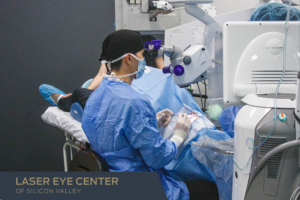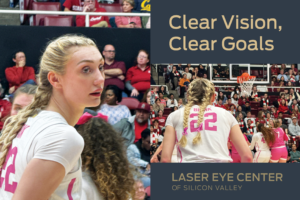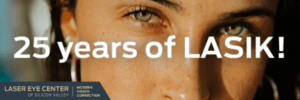One of the most common side effects of LASIK surgery is temporary discomfort caused by dry eyes. Some patients who undergo LASIK experience “dry-eye” symptoms such as light sensitivity and a burning sensation until their eyes heal fully from the surgery, usually after about 6 weeks.
This happens when nerves in the corneal surface are affected and natural tear production is decreased. However, proactive treatments and advances in LASIK technology have done a lot to eliminate this problem. Selecting the right procedure and using some simple over the counter treatments can help prevent or stop this condition from happening. Here’s how.
The first and most important remedy for dry eyes is artificial tears. It is recommended that patients who undergo LASIK use preservative-free artificial teardrops at least 4 times a day, for one full month after surgery. This should be done even if you are not prone to dry eyes, and even if you experience no symptoms after the surgery.
Preservative free drops are preferred because there is less of a chance of secondary irritation. Some good over-the-counter drops include Systane, Blink, Optive, Refresh Plus, Thera-Tears and GenTeal. For some patients, we will prescribe a dry eye treatment prior to their procedure to ensure the corneal surface is optimized.
These steps should be more than enough to treat dry eye discomfort. However, a small number of patients (usually those suffering from chronic dry eyes before surgery) may require prescription treatments such as Meibo (oil-based eyedrop) and Tyrvaya (nasal spray).
Some additional remedies include:
• Staying hydrated. Drink lots of water to help your body with natural tear production
• Avoid drinking too much caffeine, which has a dehydrating/diuretic effect
• Use gel lubrication at night. Gel lubricated tears like GenTeal are more viscous and tend to last longer.
• Omega-3 fatty acids, such as that found in fish oil, to optimize the oily portion of the tear film
• Use baby shampoo eyelid scrubs to clean your eyelids regularly
• Use a room humidifier to help saturate the surrounding air
These steps should be more than enough to treat dry eye discomfort. However, a small number of patients (usually those suffering from chronic dry eyes before surgery) may require prescription treatments such as steroid eye drops or doxycycline pills. For a more extensive list of prescription remedies, click here.
Whether you will be prone to this condition will depend on a number of things.
A list of factors to consider includes:
• Age-Tear glands become less efficient with age
• Alcohol-Alcohol use has a dehydrating effect and may aggravate dry eyes
• Cigarettes-The smoke from cigarettes can likewise cause irritation and dried out eyes
• Hormones-Hormonal changes can cause dry eye symptoms. Dry eye is a common side effect of menopause
• Computer Vision Syndrome-People who spend lots of time looking at screens will be more prone to dry eye syndrome.
• Make-up Products-Eyeliners can affect the lipid tear layer, which is produced on the eyelid margin, and decrease tear break-up time.
• Vasoconstrictors-Standard eye drops like Visine may temporarily make you eyes look less red, but do not treat the underlying cause of the redness, which is usually dryness.
One of the most important things to do when considering LASIK is to give a full and accurate medical history. This will help your doctor determine whether you are at risk for a post-operative condition like dry eye, and to find the right treatment for you.
Newer procedures like Epi-LASIK (PRK) and the Visian Implantable Collamer Lens (ICL) may even offer a permanent solution. To learn more, check out our Information Library online to decide whether LASIK is right for you!





